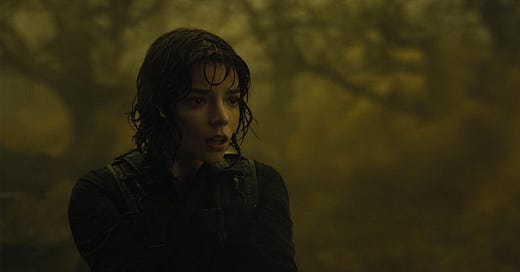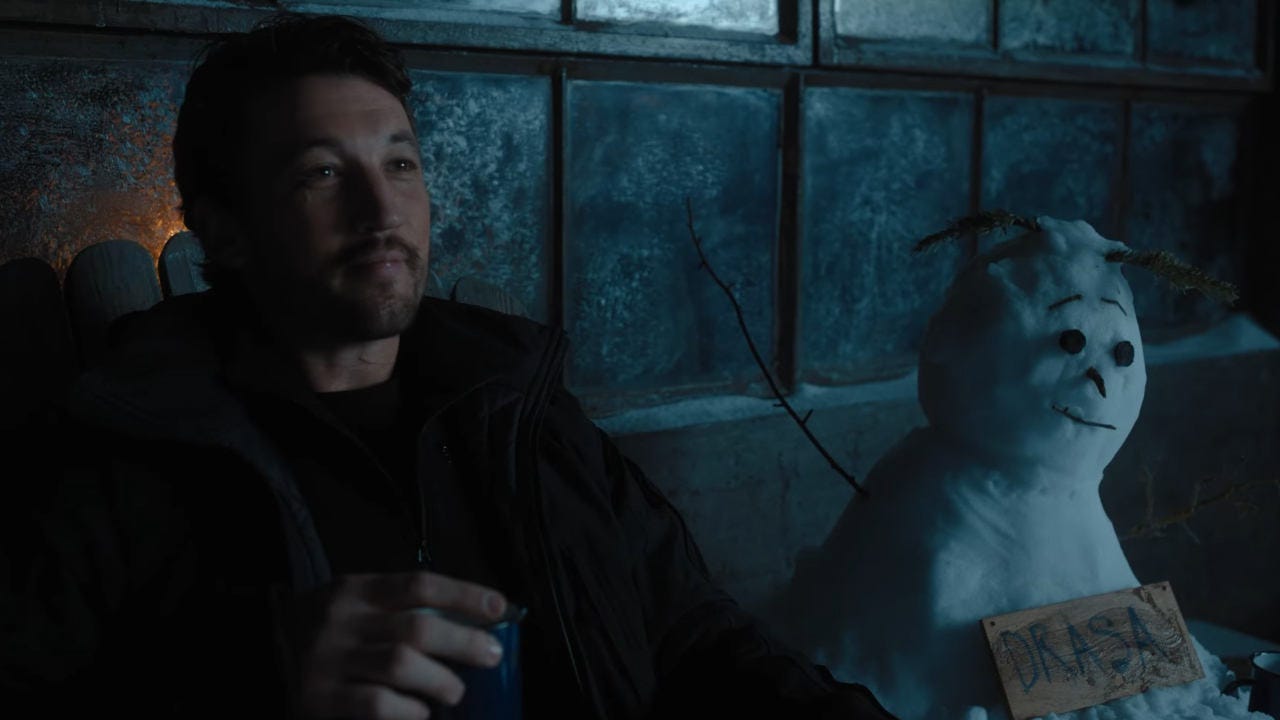Ainda que tenha tentado mascará-los, a crítica contém spoilers.
Um filme igual a Entre Montanhas convida naturalmente a interpretações simbólicas ou metafóricas, enquanto conserva o interesse provocado pela real natureza do local misterioso para onde os personagens principais são enviados. É uma pena que tenha sido lançado apenas no streaming da AppleTV+, e não tenha sido exibido no cinema, onde a experiência coletiva acentuaria os desdobramentos da trama e a imensidão da natureza se tornaria ainda mais opressiva do que já é.
O roteiro é escrito por Zach Dean (de Um Dia para Viver e A Guerra do Amanhã) e tem como protagonistas os ex-militares Levi (Miles Teller) e a lituana Drasa (Anya Taylor-Joy), enviados para vigiar os lados opostos de um desfiladeiro, como se revivessem os sonhos mais úmidos de uma guerra fria sob a perspectiva de um paraíso belicista. Os dois personagens têm passados traumáticos provocados ou pela falta de propósito ou pela depressão após a morte de um ente querido, e aceitaram a missão que os afastará da sociedade por pelo menos um ano. Diariamente, obedecem os protocolos - que não são muito diferentes dos números apertados por Desmond no interior da escotilha de Lost - e tomam o cuidado para que não alcance a superfície o que quer que possa haver sob a neblina daquele desfiladeiro.
Enquanto eu assistia a esses personagens, que não são muito diferentes do que tantos com os quais já havia me deparado nas telas de cinema, não podia deixar de pensar no poder da comunicação. A questão é que Levi e Drasa estão proibidos de se comunicar, e quando começam a fazê-lo, é da maneira como podem, escrevendo frases simples só compreendidas através de binóculos ou da lente do rifle, arma utilizada para chamar a atenção um do outro. Atiradores de elite devem ter um jeito particular de flertar, devo ter pensado, e rapidamente minha cabeça foi para o desfiladeiro. Um obstáculo físico a princípio intransponível e que me remeteu às redes de comunicação invisíveis que nos permitem conversar com pessoas ao redor do mundo de modo instantâneo.
Pois, se antes da internet, a solidão dificilmente era mais do que a solidão, agora pode ser compartilhada com alguém diferente - no contexto, estamos falando de nações que se odeiam, e embora Drasa faça questão de diferenciar a Lituânia da Rússia, aquele foi república da União Soviética -, mas que está na mesma situação. A solidão partilhada tem lá sua poesia. Levi e Drasa permanecem sozinhos, mas não solitários, pois podem dividir a experiência com o desfiladeiro, que não é tão insuperável assim. As palavras voam através da atmosfera, e o semblante dos atores modifica-se de forma cativante e sutil. Realmente admirei a adorável platitude que a primeira hora de Entre Montanhas me proporcionou, e agradeço à direção de Scott Derrickson (de A Entidade, O Telefone Preto e Doutor Estranho) pela calma com que estabeleceu essa metade dramaticamente romântica.
Até a narrativa dar um duplo mortal carpado, de um jeito parecido como fez Um Drink no Inferno, desenvolvendo-se dentro de um gênero outro que não o que já estávamos habituados. A mudança é drástica, e reforça a interpretação metafórica ao transformar o que simboliza a distância e a incomunicabilidade em uma espécie de inferno, no qual a perda da humanidade é expressada literalmente através da monstrificação. O impacto da reviravolta é maior do que a emoção ou empolgação de uma corrida contra o tempo e de descobertas que se tornam cada vez maiores à medida que os minutos avançam. É insana a segunda metade, apesar de eu ter preferido o conforto da primeira metade.
Ou talvez seja porque eu prefiro a união e comunicação a qualquer outra coisa, e Levi e Drasa apenas têm a capacidade de sobreviver se permanecerem juntos, um dom que aprenderam quando iniciaram rudimentarmente seu diálogo. Estados Unidos e União Soviética, digo, Rússia têm que dialogar para resolver os problemas do mundo, ou até a ganância do setor privado desumano e ganancioso? Essa interpretação é um salto de fé sobre um desfiladeiro nebuloso, mas não é tão absurdo concluir que não há futuro no reino dividido que é a geopolítica mundial contemporânea. Entre Montanhas convida a diplomacia, e esta somente tem início na comunicação. Se a personagem de Sigourney Weaver tem o destino que tem é porque não comunica a sua intenção, sequer quando a sua vida depende disso.
Mesmo que as metades narrativas pareçam bater cabeça uma na outra, sinalizam para o tema central da narrativa, e ainda que a criação daquele cenário deixe a desejar, a partir de um certo momento, Scott Derrickson sabe manter a narrativa intrigante o bastante para não perder a nossa atenção. Ele só precisaria ter se comunicado melhor, talvez.
Review in english
A film like The Gorge naturally invites symbolic or metaphorical interpretations, while maintaining the interest provoked by the real nature of the mysterious place where the main characters are sent. It is a shame that it was only released on AppleTV+, and was not shown in theaters, where the collective experience would accentuate the plot's developments and the immensity of nature would become even more oppressive than it already is.
The script is written by Zach Dean (from 24 Hours to Live and The Tomorrow War) and stars ex-military men Levi (Miles Teller) and Lithuanian Drasa (Anya Taylor-Joy), sent to watch over the opposite sides of a canyon, as if reliving the wettest dreams of a cold war from the perspective of a warmongering paradise. Both characters have traumatic pasts caused either by a lack of purpose or by depression after the death of a loved one, and they accept the mission that will save them from society for at least a year. Every day, they follow the protocols - which are not very different from the numbers squeezed by Desmond inside the Lost hatch - and take care not to reach the surface or whatever may be under the fog of that canyon.
As I watched these characters, who are not very different from so many I have seen on the big screen, I couldn't help but think about the power of communication. The thing is, Levi and Drasa are forbidden from communicating, and when they start to do so, it's in the best way they can, writing simple sentences that can only be understood through binoculars or the lens of the rifle, a weapon used to get each other's attention. Snipers must have a particular way of flirting, I must have thought, and my mind quickly went to the canyon. A physical obstacle that was initially insurmountable and that reminded me of the invisible communication networks that allow us to talk to people around the world instantly.
For, if before the internet, loneliness was hardly more than loneliness, now it can be shared with someone different - in the context, we are talking about nations that hate each other, and although Drasa makes a point of differentiating Lithuania from Russia, the former was a republic of the Soviet Union -, but who is in the same situation. Shared loneliness has its poetry. Levi and Drasa remain alone, but not lonely, because they can share the experience with the canyon, which is not so insurmountable. The words fly through the atmosphere, and the actors' faces change in a captivating and subtle way. I really admired the lovely platitude that the first hour of Over the Hills gave me, and I thank the direction of Scott Derrickson (of Sinister, The Black Telephone and Doctor Strange) for the calm with which he established this dramatically romantic half.
Until the narrative does a double somersault, in a similar way to what From Dusk Till Dawn did, developing within a genre other than the one we were already accustomed to. The change is drastic, and reinforces the metaphorical interpretation by transforming what symbolizes distance and incommunicability into a kind of hell, in which the loss of humanity is literally expressed through monstrousness. The impact of the twist is greater than the thrill or excitement of a race against time and discoveries that become greater and greater as the minutes go by. The second half is insane, although I preferred the comfort of the first half.
Or maybe it's because I prefer unity and communication to anything else, and Levi and Drasa only have the ability to survive if they stay together, a gift they learned when they rudimentarily began their dialogue. Do the United States and the Soviet Union, I mean, Russia, have to talk to solve the world's problems, or even the greed of the inhumane and greedy private sector? This interpretation is a leap of faith over a misty canyon, but it is not so absurd to conclude that there is no future in the divided realm that is contemporary global geopolitics. The Gorge invites diplomacy, and this only begins with communication. If Sigourney Weaver's character has the fate she has, it is because she does not communicate her intentions, even when her life depends on it.
Even though the narrative halves seem to butt heads with each other, they signal the central theme of the narrative, and even though the creation of that scenario leaves something to be desired, from a certain point on, Scott Derrickson knows how to keep the narrative intriguing enough to not lose our attention. He just needed to have communicated better, perhaps.
Crítica em vídeo







